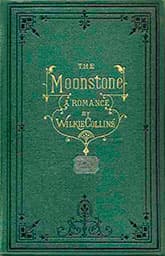The Moonstone
Critique • Quotes
 First one-volume edition, 1871
First one-volume edition, 1871First publication
1868, serialized in magazine All the Year Round
First book publication
1868
Literary form
Novel
Genre
Literary, mystery, crime
Writing language
English
Author's country
England
Length
Approx. 174,000 words
Masterpiece mystery
The Moonstone is sometimes presented as the first great mystery novel. It wasn't the first of its kind though.
Wilkie Collins's own The Woman in White eight years earlier featured a mystery and a crime-solving detective to boot. Edgar Allan Poe had introduced both mystery and the ratiocinating detective in stories nearly two decades before that, and other less-acclaimed writers had extended them to the novel form. Even earlier works by Dickens could be read as mysteries or crime stories.
But what makes The Moonstone stand out as genre-defining is that it is just so good.
It's a complete mystery, containing many of the elements that became staples in the mystery field: a stolen gem with an exotic and bloody past, bumbling cops, an amateur sleuth, misdirection (red herrings), re-enactment of the crime, sensational plot twists, and all the hallmarks of what became known as the British cozy mystery, featuring a limited circle of suspects in a secluded setting (often a country home, as here).
But The Moonstone is also such a well—and popularly—written novel, quite apart from the mystery elements. Much of The Moonstone is at least the equal of Dickens's novels, while being overall more accessible and more entertaining.
Collins's characters in this novel are as vividly drawn as any in Victorian literature. Yet they are drawn not by detailed description but by the characters' own dialogue, thoughts, jokes and diversions. Through all their actions, The Moonstone's players have their features repeatedly underlined—to the point they become familiar old friends, both comfortingly and annoyingly as intended.
It helps that the story is told by the characters themselves through their own written accounts. This method of narration comes across as not at all as forced as you might expect—nor as startling as in some other Collins novels. It is a testament to the amount of planning and juggling of plot elements the author must have carried out to make the story flow so naturally through the epistolary devices in The Moonstone.
Granted, the sustained high-wire act does break down somewhat near the end. Like many a great writer, Collins writes more interestingly when dealing with striving towards goals, depicting the hardships and inner anguish along the way, than with the triumph and aftermath. Typical of this in The Moonstone is Franklin (the gentleman sleuth) seeking the love of Rachel despite her thinking he's the thief. After a novel's worth of headstrong resistance, Rachel suddenly gives in on cue. This and the bliss to follow are even revealed third-hand, as if the relationship is now of little importance, once it's been consummated, so to speak.
The opium "experiment" that clinches the mystery's solution by somehow allowing a reconstruction of the crime is also somewhat incredible. Everything falls into place too easily (though I suspect readers don't mind at this point, after all the expertly drawn-out suspense). And the concluding details are wrapped up in a postscript, again as if no longer of any great importance.
But perhaps Collins is onto something here. The tendency of most novelists of his era is to drag out the endings, tying up all loose ends and giving readers the pleasure of sharing in their sympathetic characters' success or failure. But for Collins and his readers, the story is the journey—the exciting, bewitching, roller-coaster of a journey—not the destination. And this ending-the-story-when-it-ends approach is especially taken up by popular writers in the years to come. Personally, I often find myself frustrated by endings that don't wrap everything up in deliberate fashion, but I accept the effectiveness of the quick ending in the hands of a master storyteller.
And maybe this is the point to be made about The Moonstone. There are all kinds of stories to be told—all kinds have existed from ancient times into our postmodernist times—and some get typed as "literary", some get typed as genres like "adventure" or "mystery" or "romance". But they all have to do with kinds of human experience. They all have their skilled and unskilled practitioners, who try to make their stories connect with interested readers. What counts—what makes great literature—is how well they are able to do this.
Wilkie Collins is a master storyteller. The Moonstone is where his ground-breaking techniques—on show in much of his writing before and after—come together most demonstrably in one novel, producing a literary-quality piece of work that also helps found several literary genres. He connects.
— Eric
Critique • Quotes

